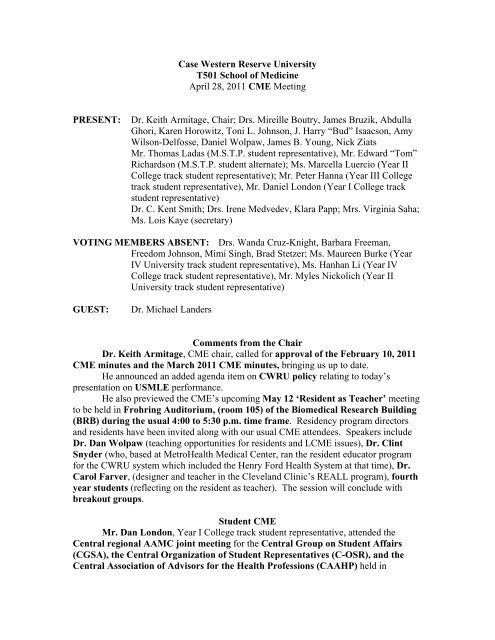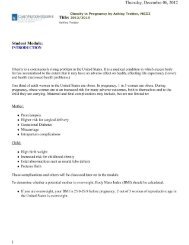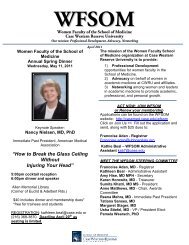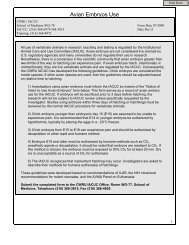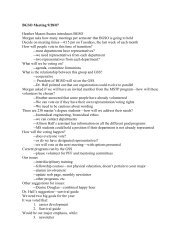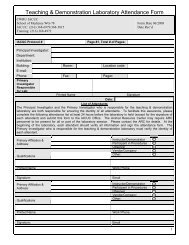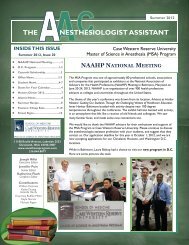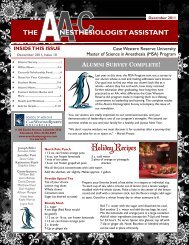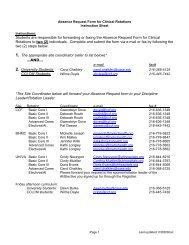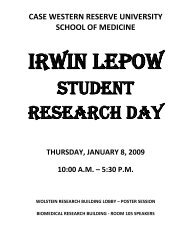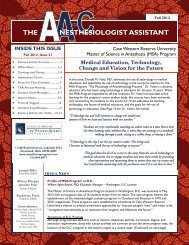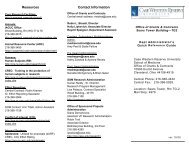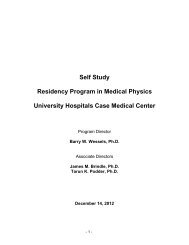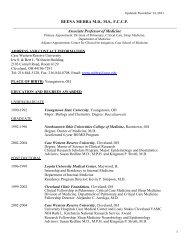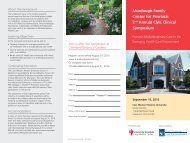4-28-2011 - Case Western Reserve University School of Medicine
4-28-2011 - Case Western Reserve University School of Medicine
4-28-2011 - Case Western Reserve University School of Medicine
You also want an ePaper? Increase the reach of your titles
YUMPU automatically turns print PDFs into web optimized ePapers that Google loves.
<strong>Case</strong> <strong>Western</strong> <strong>Reserve</strong> <strong>University</strong><br />
T501 <strong>School</strong> <strong>of</strong> <strong>Medicine</strong><br />
April <strong>28</strong>, <strong>2011</strong> CME Meeting<br />
PRESENT: Dr. Keith Armitage, Chair; Drs. Mireille Boutry, James Bruzik, Abdulla<br />
Ghori, Karen Horowitz, Toni L. Johnson, J. Harry “Bud” Isaacson, Amy<br />
Wilson-Delfosse, Daniel Wolpaw, James B. Young, Nick Ziats<br />
Mr. Thomas Ladas (M.S.T.P. student representative), Mr. Edward “Tom”<br />
Richardson (M.S.T.P. student alternate); Ms. Marcella Luercio (Year II<br />
College track student representative); Mr. Peter Hanna (Year III College<br />
track student representative), Mr. Daniel London (Year I College track<br />
student representative)<br />
Dr. C. Kent Smith; Drs. Irene Medvedev, Klara Papp; Mrs. Virginia Saha;<br />
Ms. Lois Kaye (secretary)<br />
VOTING MEMBERS ABSENT: Drs. Wanda Cruz-Knight, Barbara Freeman,<br />
Freedom Johnson, Mimi Singh, Brad Stetzer; Ms. Maureen Burke (Year<br />
IV <strong>University</strong> track student representative), Ms. Hanhan Li (Year IV<br />
College track student representative), Mr. Myles Nickolich (Year II<br />
<strong>University</strong> track student representative)<br />
GUEST: Dr. Michael Landers<br />
Comments from the Chair<br />
Dr. Keith Armitage, CME chair, called for approval <strong>of</strong> the February 10, <strong>2011</strong><br />
CME minutes and the March <strong>2011</strong> CME minutes, bringing us up to date.<br />
He announced an added agenda item on CWRU policy relating to today’s<br />
presentation on USMLE performance.<br />
He also previewed the CME’s upcoming May 12 ‘Resident as Teacher’ meeting<br />
to be held in Frohring Auditorium, (room 105) <strong>of</strong> the Biomedical Research Building<br />
(BRB) during the usual 4:00 to 5:30 p.m. time frame. Residency program directors<br />
and residents have been invited along with our usual CME attendees. Speakers include<br />
Dr. Dan Wolpaw (teaching opportunities for residents and LCME issues), Dr. Clint<br />
Snyder (who, based at MetroHealth Medical Center, ran the resident educator program<br />
for the CWRU system which included the Henry Ford Health System at that time), Dr.<br />
Carol Farver, (designer and teacher in the Cleveland Clinic’s REALL program), fourth<br />
year students (reflecting on the resident as teacher). The session will conclude with<br />
breakout groups.<br />
Student CME<br />
Mr. Dan London, Year I College track student representative, attended the<br />
Central regional AAMC joint meeting for the Central Group on Student Affairs<br />
(CGSA), the Central Organization <strong>of</strong> Student Representatives (C-OSR), and the<br />
Central Association <strong>of</strong> Advisors for the Health Pr<strong>of</strong>essions (CAAHP) held in
- 2 -<br />
Cleveland, April 14-17. Presentations <strong>of</strong> note include: 1) competency-based<br />
pr<strong>of</strong>essionalism education and assessment by the <strong>University</strong> <strong>of</strong> Indiana, and 2) unique<br />
student advising models that combine academic and mental health/personal<br />
advising in one center by the <strong>University</strong> <strong>of</strong> Iowa. Ms. Cecelia Zhang, a third year<br />
student in the <strong>University</strong> Track, was chosen as the regional delegate to the Community<br />
and Diversity Committee, whose mission is to encourage underrepresented minority<br />
high school/undergraduate students to pursue careers in the medical field.<br />
Report <strong>of</strong> USMLE Step 1<br />
and Step 2 Clinical Knowledge (CK) and Clinical Skills (CS)<br />
Performance <strong>of</strong> CWRU <strong>School</strong> <strong>of</strong> <strong>Medicine</strong> students<br />
Compared to the national average<br />
Dr. Klara Papp, Director <strong>of</strong> the Center for the Advancement <strong>of</strong> Medical<br />
Learning (CAML), announced that for this year’s report on student achievement on the<br />
USMLE Steps 1 and 2, she was projecting a PowerPoint presentation in lieu <strong>of</strong><br />
distributing paper handouts. Dr. Papp invites your feedback on this format<br />
(Klara.Papp@case.edu).<br />
USMLE Step 1<br />
Dr. Papp began by focusing on the USMLE Step 1.<br />
<strong>University</strong> track students must have taken and passed the USMLE Step 1 by<br />
December 31 <strong>of</strong> their third year or they cannot be promoted to fourth year.<br />
Dr. Jim Young interjected that College track students must take—but do not<br />
have to pass—the USMLE Step 1 before they start their clerkships.<br />
Dr. Amy Wilson-Delfosse added that <strong>University</strong> track students must have taken<br />
and passed the USMLE before they start their clerkships.<br />
Dr. Dan Wolpaw explained that if a student fails the USMLE Step 1, he/she<br />
completes the clerkship in progress and then re-takes the exam. The student cannot<br />
resume clerkships until passing the exam.<br />
Dr. Wolpaw cited a new trend in evidence at the <strong>University</strong> <strong>of</strong> Pennsylvania and<br />
Duke, where students take the USMLE Step 1 after clerkships.<br />
Dr. Papp added that now, since Step 1 USMLE questions are vignette casebased,<br />
some feel that clinical experience helps students achieve higher scores on the<br />
USMLE Step 1.<br />
Dr. Armitage noted that unfortunately the USMLE Step 1 is becoming “MCATs<br />
for residencies,” a high-stakes exam for entrance into competitive residencies, a<br />
purpose for which it was never intended. This is an extremely difficult situation to<br />
resolve.<br />
Dr. Young suggested moving forward with competency assessment, and Dr.<br />
Wilson-Delfosse suggested making the exam pass/fail.<br />
Dr. Papp projected a line graph <strong>of</strong> first time USMLE Step 1 test-takers starting<br />
with the Class <strong>of</strong> 2002 and ending with the Class <strong>of</strong> 2012, graphed against the national<br />
average. The graph shows a widening gap across time with CWRU students scoring<br />
higher than the national average.
34.<br />
- 3 -<br />
Dr. Armitage inquired if there was a similar rise in MCAT scores.<br />
Dr. Dan Wolpaw mentioned that our students’ MCATs have increased from 33 to<br />
Dr. Armitage played devil’s advocate and wondered if CWRU is simply<br />
recruiting good test-takers.<br />
Dr. Papp refused to accept that test taking skills alone account for the observed<br />
increases in CWRU students’ performance and insisted that our curriculum is most<br />
certainly a contributing factor.<br />
Dr. Young regards MCATs as the best predictor <strong>of</strong> USMLE Step 1 performance.<br />
Dr. Papp explained that the standard deviation indicated on the graph is an<br />
important measure in validating that our students score significantly higher than the<br />
national average.<br />
Dr. Wolpaw added that our new curriculum has things added that cannot be<br />
measured.<br />
Dr. Papp called attention to a list <strong>of</strong> disciplines with “whisker plots” indicating<br />
the national average in each discipline area and within that range, boxes indicating<br />
CWRU performance. The vertical green line represents the national mean. All boxes<br />
are to the right <strong>of</strong> the green line. From this table, we can conservatively conclude that<br />
there are subject areas in which CWRU students, on average, are performing above<br />
the national average.<br />
Dr. Papp explained that we are working in means. The distribution <strong>of</strong> scores is<br />
lost when you summarize scores down to one number. Both national and CWRU scores<br />
on the USMLE Step 1 during 2010 were plotted on a range <strong>of</strong> less than 155 (failing) to<br />
greater than 245. The passing score was 188, a three-digit score.<br />
Dr. Armitage added that the NBME will stop providing the two-digit scores to<br />
residency program directors, because <strong>of</strong> the resulting confusion and frequent<br />
misinterpretation.<br />
Dr. Young added that the licensure exam is designed for students to pass. Scores<br />
are skewed and do not represent a Gaussian distribution. The exam is not strictly normreferenced.<br />
The NBME uses performance <strong>of</strong> test-takers from the previous three years as<br />
the criterion-reference group.<br />
Dr. Armitage questioned whether you can predict poor performance—be it<br />
medical, personal, or academic.<br />
Dr. Kent Smith felt that it is easier to predict performance at the right (strong)<br />
than at the left (failing).<br />
Dr. Young reiterated his contention that MCATs are the only significant<br />
predictor <strong>of</strong> USMLE Step 1 performance.<br />
Dr. Papp and Dr. Wilson-Delfosse disagreed. Using the NBME test item bank<br />
to construct cumulative achievement tests for students at the end <strong>of</strong> each block, we<br />
have found that the combined aggregated scores can account for an estimated 60%<br />
<strong>of</strong> the variance on USMLE Step 1.<br />
Dr. Armitage feels that our medical school does so much more than simply<br />
prepare students to pass the USMLE Step 1.<br />
Dr. Papp added that we are trying to write integrative reasoning questions that<br />
test more than only medical knowledge.
- 4 -<br />
Performance on USMLE Step 2 Clinical Knowledge (CK) and<br />
USMLE Step 2 Clinical Skills (CS)<br />
CWRU students must have completed the USMLE Step 2 by January 31 <strong>of</strong><br />
the anticipated year <strong>of</strong> graduation and must pass both parts (CK-a multiple-choicequestion<br />
exam and CS-a clinical skills exam) in order to graduate.<br />
Dr. Wolpaw explained that it takes longer to get the Clinical Skills results back.<br />
He added that residencies at the Universities <strong>of</strong> San Francisco and Pennsylvania require<br />
all three steps to rank you.<br />
Dr. Mireille Boutry mentioned that she does not have the USMLE Step 2 scores<br />
when interviewing candidates for residency at <strong>University</strong> Hospitals.<br />
USMLE Step 2 CK (Clinical Knowledge)<br />
Dr. Papp projected a graph <strong>of</strong> national and CWRU performance <strong>of</strong> first time testtakers<br />
<strong>of</strong> the USMLE Step 2 CK (Clinical Knowledge) spanning Classes <strong>of</strong> 2001<br />
through <strong>2011</strong>. CWRU has intersected with national performance over the last few<br />
years.<br />
Dr. Karen Horowitz inquired why scores are rising.<br />
Dr. Papp explained that this is not standardized to each cohort’s performance.<br />
The NBME has observed that scores are rising every year and uses the previous three<br />
years as cohorts and adjusts the standard scores accordingly.<br />
Dr. Young added that since there is a different kind <strong>of</strong> question today than ten<br />
years ago, so it is difficult to explain the rise in scores.<br />
Dr. Papp mentioned that there are many reasons why students do not pay as<br />
much attention to the USMLE Step 2 Clinical Knowledge exam, one being less time<br />
to study for it than the USMLE Step 1.<br />
When Dr. Armitage asked whether this is <strong>of</strong> concern to us, Dr. Wolpaw answered<br />
that it is hard to know; there have been a variety <strong>of</strong> approaches.<br />
Dr. Boutry inquired whether there is a correlation between performance on the<br />
USMLE Step 1 and Step 2. She has seen a huge difference in interviewing applicants.<br />
Dr. Wolpaw replied that he has been told it is close.<br />
Dr. Smith mentioned that those who matched are <strong>of</strong>ten told to take the<br />
USMLE Step 2 as late as possible and not to spend an inordinate amount <strong>of</strong> time<br />
studying for it.<br />
Dr. Young recalled the stellar performance <strong>of</strong> one student who took the USMLE<br />
Step 2 after interviews.<br />
Dr. Papp mentioned that the histogram for USMLE Step 2 Clinical Knowledge<br />
performance showed “whisker plots” with the green line equal to the national average.<br />
Here the CWRU boxes are closer to the green line. The histogram <strong>of</strong> CWRU scores<br />
more closely parallels the national average.<br />
Drs. Armitage and Young agreed about resisting the urge to over-interpret. We<br />
should make use <strong>of</strong> the data whenever possible in ways to help some individuals<br />
improve.<br />
Dr. Ghori advocated looking at whether our students get their first choice<br />
residency.
- 5 -<br />
Dr. Dan Wolpaw added that the NBME is adding interpretive questions, for<br />
example, including pharmaceutical ads. He felt that the USMLE Step 2 is a well<br />
organized exam.<br />
USMLE Step 2 CS (Clinical Skills)<br />
Dr. Papp recalled the USMLE Step 2 CS (Clinical Skills) exam as starting with<br />
the Class <strong>of</strong> 2005. It is a 10-station exam using standardized patients. Students must<br />
take the USMLE Step 2 CS by November 1 <strong>of</strong> their fourth year, after all core<br />
clinical rotations are finished. It is intended to test “bread and butter” (basic) medicine<br />
not “esoteric” (obscure) knowledge.<br />
The USMLE Step 2 CS consists <strong>of</strong> three components:<br />
The Integrated Clinical Encounter (ICE), involving data gathering, history<br />
taking, composing a patient note. All notes are graded to provide student<br />
feedback. A group <strong>of</strong> 200 students generates eight notes a piece.<br />
Communication and Interpersonal Skills (CIS), involving questioning skills,<br />
information-sharing skills, pr<strong>of</strong>essional manner and rapport<br />
Spoken English Pr<strong>of</strong>iciency (SEP)<br />
Both Drs. Ghori and Boutry regard the USMLE Step 2 CS as more <strong>of</strong> a moneymaking<br />
tool than anything else, as it is an expensive exam and students must travel far to<br />
reach the testing site.<br />
Dr. Armitage sees positive value in “driving curriculum changes,” and the<br />
USMLE Step 2 CS has motivated many medical schools to change their curriculum to<br />
place greater emphasis on clinical skills. The use <strong>of</strong> communication skills for both<br />
international and domestic students is important.<br />
Dr. Wolpaw mentioned that students have learned how to take this exam and the<br />
failure rate is low.<br />
Dr. Horowitz inquired why there are not traveling testers instead <strong>of</strong> making<br />
students travel to the exam site.<br />
Members recalled former CWRU faculty member and CME member, Peter V.<br />
Scoles, M.D., now Senior Vice President for Assessment Programs at the NBME, an<br />
early advocate <strong>of</strong> the USMLE Step 2 CS licensure examination.<br />
Dr. Wolpaw referred to the International Foundations in <strong>Medicine</strong> (iFoM)<br />
examination for medical students around the world. It is still being pilot-tested and our<br />
students have participated, as CWRU is a pilot site.<br />
Dr. Papp added that we would like to extend the opportunity to participate to<br />
College track third year students who have completed their core clerkships as well.<br />
Revisitation <strong>of</strong> USMLE Step 2 Policy at CWRU<br />
Drs. Keith Armitage, Dan Wolpaw, and Kent Smith brought up a policy issue<br />
arising during a recent Committee on Students meeting. The student in question had<br />
passed the USMLE Step 1 in 2002 without requesting any special accommodations from<br />
the NBME, though eligible. The student failed the USMLE Step 2 CK three consecutive<br />
times, again without requesting any special accommodations from the NBME. The<br />
student has not been enrolled here since 2004 and would like to take the exam again now.<br />
CWRU has an existing policy for taking the USMLE Step 1 but none for the USMLE
- 6 -<br />
Step 2. Should the <strong>School</strong> <strong>of</strong> <strong>Medicine</strong> have a policy specifying: 1) How many times<br />
a student can take the USMLE Step 2? 2) A time limit for taking the USMLE Step<br />
2?<br />
Dr. Smith recently returned from a meeting <strong>of</strong> the 13 <strong>School</strong> Consortium. Seven<br />
schools do not require the USMLE Step 2 exam to graduate. Six schools do not require<br />
any USMLE licensure exam to graduate. CWRU requires passage <strong>of</strong> the USMLE Step<br />
1 and USMLE Step 2 CK and CS to graduate. A table <strong>of</strong> the 13 schools with their<br />
policy regarding USMLE Steps 1 and 2 is attached, with CWRU represented by the<br />
letter L.<br />
Dr. Young noted that every state requires passing the USMLE Step 2 in order<br />
to get a medical license.<br />
Dr. Smith explained that once a student graduates from the <strong>University</strong>, the <strong>School</strong><br />
<strong>of</strong> <strong>Medicine</strong> is no longer obligated to sponsor him/her.<br />
Dr. Wolpaw mentioned the existing policy specifying number <strong>of</strong> times a CWRU<br />
student can take the USMLE Step 1: The student has three times to pass the USMLE<br />
Step 1.<br />
Dr. Smith reiterated that <strong>University</strong> track students must take the USMLE Step 1<br />
by December 31 <strong>of</strong> their third year or they cannot be promoted to fourth year. A student<br />
not passing the USMLE Step 1 the first time can continue in the block. However, if<br />
he/she fails a second time, he/she must drop out <strong>of</strong> the block until passage <strong>of</strong> the exam.<br />
Drs. Armitage and Young repeated that a physician cannot get a license anywhere<br />
without passing the USMLE Step 2.<br />
Dr. Wolpaw suggested that the Society Deans meet with curriculum leaders<br />
and Lerner College leaders to draft a policy about the USMLE Step 2 CK and CS to<br />
bring before the CME. On behalf <strong>of</strong> the Society Deans, Dr. Smith agreed to the<br />
request.<br />
The meeting concluded with a brief discussion <strong>of</strong> accommodation requests.<br />
Students are not able to request special accommodations anonymously from the NBME.<br />
Also, the exam is indicated as a “special accommodation” exam.<br />
Respectfully submitted,<br />
Lois Kaye<br />
Secretary to the CME


